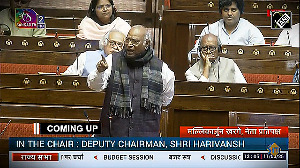The Reserve Bank of India may start unwinding the market stabilisation scheme in the wake of continuing shortage in the liquidity position.
According to market sources, the additional liquidity in the system has been gradually drained out, evident from the decline of in reverse repo bids from daily figures of Rs 30,000-40,000 crore (Rs 300-400 billion) to a low of Rs 3,000 crore (Rs 30 billion).
MSS was introduced to suck out excess liquidity from the system. The RBI has already started rejecting excess bids for the 91-day treasury bills, which forms part of the MSS.
In the last auction, as against a notified amount of Rs 2,000 crore (Rs 20 billion), bids of Rs 670 crore (Rs 6.7 billion) were accepted. In the treasury bill auction released for the second quarter of the current financial year, there have been no net issuances of T-bills as part of the MSS scheme.
Although MSS issuances were capped at Rs 80,000 crore (Rs 800 billion), only Rs 65,000 crore (Rs 650 billion) has been spent till date.
Dealers said the liquidity position should not have become so tight had the government continued with its expenditure programme.
Some dealers said to avoid an inflationary impact of the growing money base, expenditure has been clamped down.
If money supply grows, then it puts pressure on inflation, making a case for an interest rate hike.
Credit pick-up has been quite robust in the banking sector, further putting pressure on the liquidity situation along with the government borrowing programme.
However, a major part of the borrowing programme gets over in the first half of the current fiscal.
Market sources are of the view that there was no reason for the market to panic on account of liquidity, as the entire MSS can be rolled back to the system to infuse the necessary liquidity.






 © 2025
© 2025